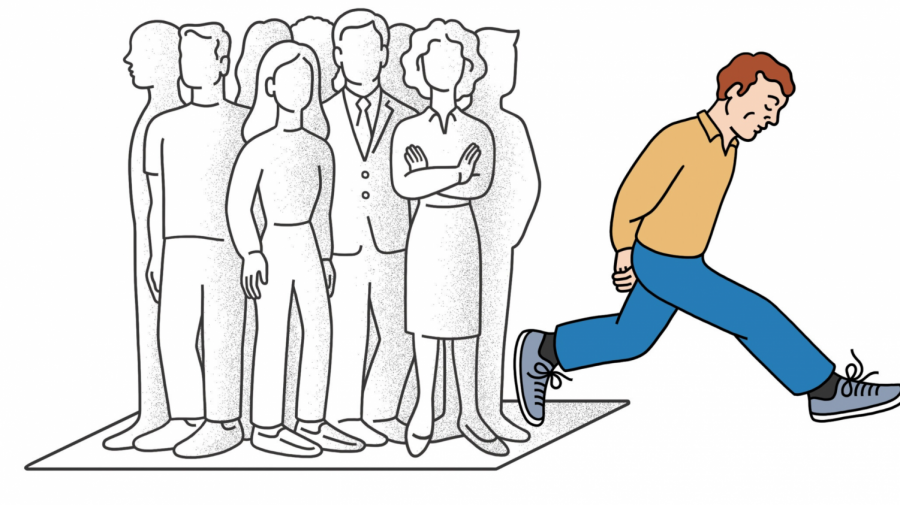Are (Most) Jews White?
February 8, 2021
In our recent virtual assembly devoted to racial equity and justice, one student asked a question about the complex and often under-explored relationship between Judaism and whiteness. The discussion of race in the Jewish community is complicated and potentially misinterpreted by an often unspoken assumption that Jews are white—which, by statistical measures, is an assumption that should come as no surprise. According to a recent survey done by the Pew Research Center, 94 percent of Jews are white. Researchers at Brandeis University in 2013 put their estimate slightly lower, at 89 percent. But that’s exactly what it is. An estimate. Most of these surveys and polls cannot account for the complexity of what whiteness even means and even the implication of the question Are (most) Jews white?
Of course, there are Jews of color – Black, Asian, and even Mizrahi Jews – in the United States and these are people who would not be seen as white and would not probably identify as such. But the question of whiteness in Judaism cannot be answered by a poll or survey.
Eric Goldstein, an associate professor of history at Emory University, was recently interviewed for an Atlantic article Are Jews White? The Alt-Right Reopens Questions of Jewish Whiteness, saying, “Jewish identity in America is inherently paradoxical and contradictory. What you have is a group that was historically considered, and considered itself, an outsider group, a persecuted minority. In the space of two generations, they’ve become one of the most successful, integrated groups in American society—by many accounts, part of the establishment. And there’s a lot of dissonance between those two positions.”
Dating back well into early American history, the Naturalization Act of 1790 considered Jews to be among “free white persons” who could be allowed citizenship. But later laws limited the number of immigrants from certain countries, in part targeting Jews. Despite being subjected to immigration quotas, Jews, unlike Asian and African immigrants, were still considered “Caucasian” in the late 19th century.
Yet from a cultural standpoint, the racial status of Jews is much more complex. Early Americans commonly viewed Jews as a separate racial category. The Natural Varieties of Mankind, a book written by Johann Blumenbach in 1775, which birthed scientific conceptualizations of race, spoke of the “racial face” of Jews. Blumenback aimed to correlate climate with culture and outward appearance, and he firmly believed that certain groups maintained their distinctive physical and cultural characteristics even over changing geographic locations. He wrote that “the Jewish race presents the most notorious and least deceptive” example supporting his theory and that their “race” can “easily be recognized everywhere by their eyes alone, which breathe of the East.”
Wide-spread anti-Semitism in the late 19th and early 20th centuries excluded Jews from certain jobs, joining many clubs, and from moving into certain neighborhoods, mirroring the redlining in the US that affected millions of people of color. Either as a result of or by virtue of this segregation, many Jews lived in tightly knit urban communities distinctly marked from other American cultures and predominantly spoke Yiddish. If “whiteness” in America represents being a part of the dominant culture, Jews in the early 20th century were not white despite having fair skin.
Yet “there has been a huge shift in the past 50-75 years [in America] from Jews being a ‘degenerate race’ and really looked down upon to more of a shift based on certain policies within our country to view Jews as white,” said Robin Joseph, a cantor at Temple Beth Shalom in Hastings whom I recently interviewed. “I think Jews have been very comfortable with being white and benefitting from that.”
She added that “it’s difficult for people who are white (and generally white Jews) who have benefitted from policies to understand that they’re in that category of being part of the benefitted group of the United States. I think that many Jews are resistant to the idea that they could be a part of a privileged class of people because Jews have so often been persecuted and marginalized in this society. So it’s hard to kind of reconcile those two—being at the same time a group of people that’s been persecuted and continues to be persecuted in various parts of this country—blatantly or not—and at the same time be part of a privileged class.”
Yet not seeing oneself as white despite having seemingly white skin does not necessarily mean an unwillingness to accept certain privileges. For some Jews in America, identifying as white is seen as a denial of the hardship their ancestors faced.
One anonymous Jewish commenter in a recent NY Times article I’m Jewish and Don’t Identify as White. Why Must I Check That Box? wrote, “I am alive to tell this because of [my ancestor’s] sacrifices generation after generation. Calling me white not only lumps me into the wrong race, it denies my ancestry and the intergenerational race-related trauma my family had to survive so that I can live today. Calling me white does what Hitler wanted years after my family escaped the pogroms: for the surviving Ashkenazis to deny their own heritage and hide, letting their heritage die. I am not white just because I have fair skin.”
According to Judith Rosenbaum, author of the essay Living the Legacy, although the vast majority of Jews “have benefitted and continue to benefit from white privilege,” the ambivalence that many Jews experience stems from “an anti-universalist impulse that does not want Jews to be among the ‘melted’ in the proverbial melting pot” as well as “a deep connection to a Jewish history of discrimination and otherness.”
In our current world, although Jews with white skin do have certain privileges, there are these “exogenous forces – ostracism, and exile, and other forms of persecution [like] extermination” that shape the Jewish identity and that is “programmed into the DNA of the Jewish people,” according to Jonathan Greenblatt, the CEO of the Anti-Defamation League.
As a Jew myself I have heard hundreds of times “our ancestors were liberated from the land of Egypt,” and I certainly have considered myself indirectly liberated in a sense, if not personally liberated. As a Jewish person, I share a genetic memory of my ancestry and peoplehood. I also carry in my DNA and traditions a moral imperative to “identify with the stranger.”
I do not aim to compare the lived experience of Jews to those of Black people or to other groups that have faced oppression because I do not feel that creating a hierarchy of suffering is productive. But I cannot write this article without asking the question: Can one pass as white and benefit from certain privileges of being seen as white without identifying as white?
That raises another question: Have Jews really shared in the experience of whiteness?
Writer and professor of philosophy at NYU Kwame Anthony Appiah who recently wrote the NY Times article I’m Jewish and Don’t Identify as White. Why Must I Check That Box? seems to think that associating Jews with whiteness is forcing them to “identify with a group that has so persistently persecuted them.”
Lewis R. Gordon, the former founder of Temple University’s Center for Afro-Jewish Studies, current professor at the University of Connecticut, who is himself a Jew of color, said, “When anti-Semites still [talk about] Jews, they mean a racial category. I think they’re looking at Jews the way an anti-black racist looks at a light-skinned black person.”
Having worked with countless Jewish groups and organizations around the country, Gordon has observed that religious Jews are much more likely to view anti-Semitism as a form of religious discrimination, but he disagrees with this viewpoint. “Anti-religion is more like between Protestants and Catholics … or between a Zen Buddhist and Buddhist, or conflicts that Reform Jews have with Orthodox Jews,” Gordon said. “I see anti-Semitism as racism. I don’t see anti-Semitism as simply being about anti-religion.” If anti-Semitism is a form of racism, does that make Judaism a race?
Yet the times are changing, and American Jews generally have a lot of power and status.
But having power is no assurance of protection, and according to the FBI’s hate-crime statistics, the majority of religiously-motivated hate-crime offenses committed each year are against Jews.
Synagogues are bombed and broken into. Jewish congregants are killed.
In 2017, extremist demonstrators in Charlottesville chanted, “Jews will not replace us.”
White houses of worship don’t regularly get threatened or vandalized. White people generally don’t get called hateful names containing centuries of weight and hatred. So how can Jews be white?
I can’t remember a year when the news didn’t mention swastikas painted on synagogues during the High Holidays. I don’t remember a year in Hastings when there weren’t multiple swastikas found in a school bathroom. There are multiple security and volunteer guards every time my family and I enter my synagogue.
The killers who shot at Jews in the Tree of Life Synagogue in Pittsburgh and Poway would certainly not consider Jews to be white people. White supremacists do not consider Jews to be white either. But, of course, the fact that white supremacists do not see Jews as white reinstates the reason why some Jews do not want to be considered white: some think that not identifying as white ensures that the long history and present condition of experiencing hatred and discrimination will not be forgotten or denied. It is also a statement to make sure that Jews’ ancestors that have perished in the Holocaust are not forgotten.
In 2019, former President Donald Trump signed an executive order at a White House Hanukkah party establishing that anti-Semitism is punishable under Title VI of the Civil Rights Act, which is a clause that deals only with race, ethnicity, and nationality, but not discrimination on the basis of religion. So under the law, Judaism is now considered a race, ethnicity, or nationality. Under this clause, Jewish people are a “protected race.”
Yet there does seem to be a recent trend among Jews over the past half-century or so, particularly among American Jews, to see themselves as racially white, partly because accepting the label of “white” may be a way to recognize white privilege and show allyship with people of color.
How do we reconcile with this? Cantor Robin Joseph, who identifies as a white Jew, feels as though conversations about Judaism and whiteness are “sorely needed,” and noted that her congregation has been engaging with these same questions I introduced in this article for years, and that they have tried to “understand that even as Jews have been persecuted, even as Jews have been marginalized, that if we are white there’s a certain privilege that people of color and Jews of color intrinsically don’t have because there is systemic racism.”
But these conversations are not easy. She added she has been met with a lot of resistance, and “many people, some in older generations or our generation, maybe they don’t feel marginalized but they know what it’s like to feel marginalized. And they know what it’s like to feel discriminated against. And so sometimes I will hear ‘well, Jews are marginalized too’ and it’s hard to argue with that, in some ways they’re right.”


















